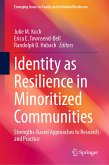Chapters address how research method selection needs to be tailored to specific contexts within which studies are carried out and how synthesizing diverse perspectives of different disciplines - such as psychology, sociology, linguistics, history, and art - make a research endeavor more fruitful. The book offers a clear framework in which to assess the research presented as well as map future directions for qualitative methodology in mental health research.
Key areas of coverage include projects that describe research with: . Individuals confronted with critical life events. . Former psychiatric patients. . Individual and couple psychotherapy clients. . Clients in a forensic setting. . Persons affected by psychosis. . Dementia patients. . People living with cancer. . Health care professionals.
Qualitative Research Methods in Mental Health is a valuable resource for researchers, professors, and graduate students as well as therapists and other professionals in clinical and counseling psychology, psychotherapy, social work, and family therapy as well as all interrelated psychology and medical disciplines.
Chapter 10, "Engraved in the Body: Ways of Reading Finnish People's Memories of Mental Hospitals" is available open access under a Creative Commons Attribution 4.0 International License via link.springer.com.
Dieser Download kann aus rechtlichen Gründen nur mit Rechnungsadresse in A, B, BG, CY, CZ, D, DK, EW, E, FIN, F, GR, HR, H, IRL, I, LT, L, LR, M, NL, PL, P, R, S, SLO, SK ausgeliefert werden.









